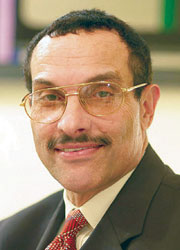Councilman Champions Change
An alumnus who has dedicated his career to public service is continuing the
push for progress, this time as a top D.C. official.
Vincent
C. Gray, BA ’64,
was elected chairman of the D.C. Council last
fall with a campaign to build “One City.”
Gray, whose career in social services has spanned
more than two decades, says he is committed
to creating a District free of gender, age,
race, or socioeconomic biases.

|

New D.C. Council
Chairman Vincent C. Gray says GW helped
prepare him for a career in advocacy and
politics. GW was a “microcosm of
the world in terms of adapting to racial
and ethnic barriers,” Gray says
about his education in the 1960s.
|
“It means recognizing the larger issues
than just one’s self, one’s street,
one’s neighborhood,” says Gray,
a native Washingtonian. “We need to recognize
our overall diversity as a city.”
Gray is used to breaking such barriers.
As a black man at a predominantly white university,
Gray stood out at GW during the height of the
civil rights movement with a dedication to academics
and leadership. In the early 1960s, Gray became
the first black member of a GW fraternity and
later served as chancellor of Tau Epsilon Phi
for two consecutive terms. He says the opportunity
was an impetus for University-wide growth.
“There’s no question that the principal
reason [for joining] was to bring an end to
segregation at GW’s fraternities,”
Gray says. “By the time I left the University,
two other fraternities had opened their doors
to minorities. But by no means were the flood
gates opened.”
Racial and social barriers inside and outside
the classroom led Gray to consider dropping
out of GW more than once, he says.
But he didn’t give up.
A close mentorship with late GW psychology
professor Eva Johnson kept him on track and
eventually led him to his first job at the Association
for Retarded Citizens after completing the clinical
psychology program in 1964.
“When faced with difficult times, it’s
easy to say it’s just the circumstances,”
Gray says. “I knew that walking away from
GW would be walking away from a challenge.”
Today Gray credits his college experience with
preparing him academically and socially for
a career in advocacy and politics. In addition
to his employment with the ARC, Gray was appointed
director of the Department of Human Services
and, in 1994, co-founded the Covenant House,
a youth services nonprofit organization. He
continues to keep in touch with some of his
fraternity brothers, he says, and has served
as a D.C. Councilman since 2005.
As chairman, Gray draws from one of his most
important lessons in life as he spells out priorities
in education.
“I’ve learned,” Gray says,
“that education is far larger than what
happens in a building or a classroom.”
—Jaime Ciavarra